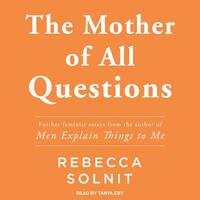Take a photo of a barcode or cover
Man, every one of these essays is so punchy and angry, I loved it! I wanted this purely for the shade Solnit throws at Hemingway and Franzen, but I underlined damn near every page of this book.
Unfortunately, it's already somewhat dated as I believe it came out before the huge #MeToo Hollywood reckoning. There are moments in essays when Solnit praises both Louis C.K. and Aziz Ansari (I take much more issue with C.K. than Ansari personally). I'm sort of surprised there wasn't a postscript in those essays as there is in an essay about Amy Schumer and her brand of white-feminism. Maybe there will be in later printings but FYI for any who wouldn't be expecting it.
Beyond that, this book is inclusive as fuck. It is written by a white cishet woman, so mileage may vary, but she did often take note that some folks don't operate in a binary or her own white privilege, etc.
Unfortunately, it's already somewhat dated as I believe it came out before the huge #MeToo Hollywood reckoning. There are moments in essays when Solnit praises both Louis C.K. and Aziz Ansari (I take much more issue with C.K. than Ansari personally). I'm sort of surprised there wasn't a postscript in those essays as there is in an essay about Amy Schumer and her brand of white-feminism. Maybe there will be in later printings but FYI for any who wouldn't be expecting it.
Beyond that, this book is inclusive as fuck. It is written by a white cishet woman, so mileage may vary, but she did often take note that some folks don't operate in a binary or her own white privilege, etc.
The first essay is packed with so many aphorisms it's ridiculous.
Note, this book was read before I got a Goodreads account as part of a challenge to read 50 new books by the end of 2019. I wrote a review for it right after I read it and copy pasted it here.
I actually read this book because I wanted to read Solnit's other book A Paradise Built in Hell, but the library didn't carry it. So I checked to see what other books were there by the same author and left with this one. It wasn't what I was looking for, but it was good just the same. I may end up shelling out money for A Paradise Built in Hell since the topic is one I am interested in (people pulling together in disasters, despite how some claim folks actually behave worse in disasters) and her very direct writing style is good.
This is a pretty good take on feminism as far as I can tell. I was a little worried that either she would take too narrow a view on what feminism is supposed to do or would only reiterate the kinds of things you hear bounced around on the internet a lot. She actually manages to both have her own interesting take on things while also doing (at least as far as I can tell) an effective job talking about intersectionality of woman-ness with lgbt, race, and economic issues. I particularly liked the essay where she talks about the language we use to talk about men and women, using the CDC guidelines for women consuming alcohol as an example. It really is intriguing how much the way we talk about things like rape without actually acknowledging that it is the result of an action by the rapist (most often a man) rather than something the (usually) woman did to effect her environment.
Very thought provoking stuff.
I actually read this book because I wanted to read Solnit's other book A Paradise Built in Hell, but the library didn't carry it. So I checked to see what other books were there by the same author and left with this one. It wasn't what I was looking for, but it was good just the same. I may end up shelling out money for A Paradise Built in Hell since the topic is one I am interested in (people pulling together in disasters, despite how some claim folks actually behave worse in disasters) and her very direct writing style is good.
This is a pretty good take on feminism as far as I can tell. I was a little worried that either she would take too narrow a view on what feminism is supposed to do or would only reiterate the kinds of things you hear bounced around on the internet a lot. She actually manages to both have her own interesting take on things while also doing (at least as far as I can tell) an effective job talking about intersectionality of woman-ness with lgbt, race, and economic issues. I particularly liked the essay where she talks about the language we use to talk about men and women, using the CDC guidelines for women consuming alcohol as an example. It really is intriguing how much the way we talk about things like rape without actually acknowledging that it is the result of an action by the rapist (most often a man) rather than something the (usually) woman did to effect her environment.
Very thought provoking stuff.
Reading Rebecca Solnit's essays is always a pleasure. She writes in a way that feels like she's speaking for me and if not for me, then to me. Required reading for feminists, for sure.
i first saw this on a list of upcoming nonfiction by women. (jazz looked it up because i was complaining about how most serious nonfiction genres seemed to be dominated by men.) and then when we looked at the list i complained about how women's nonfiction seemed to be only about feminism, personal struggles, and female figures in history. this book has all three of things AND I LOVED IT. moral of the story: read before you complain.
It's hard to pick a favorite essay in a book full of excellent essays, but I did particularly like Men Explain Lolita to Me. Solnit has such a forthright manner of speaking right to your heart, angry but eloquent.





